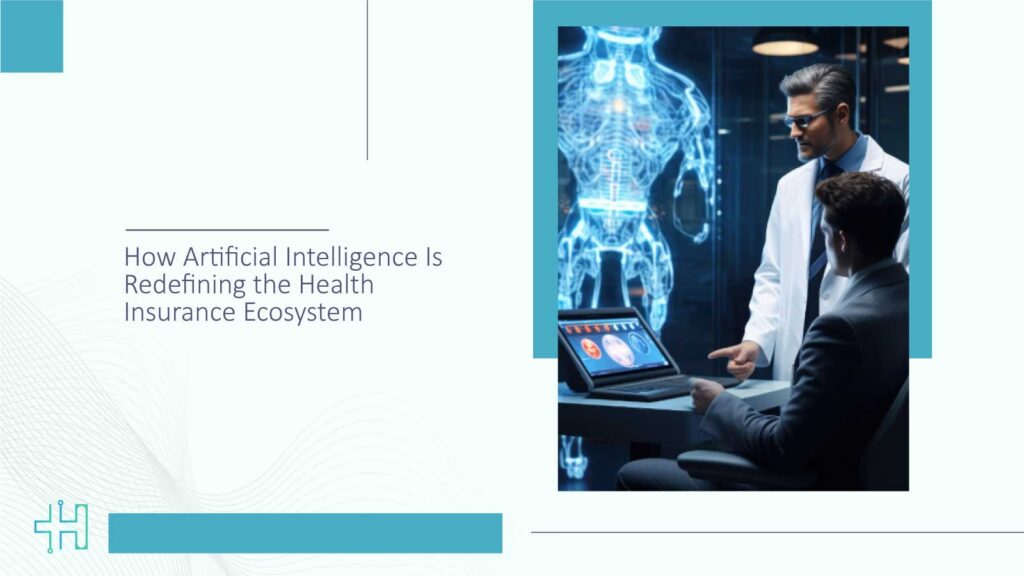For insurers who want to be proactive in a shifting landscape, artificial intelligence (AI) is the new normal rather than the exception. AI is fundamentally reshaping the health insurance landscape, from streamlining claims to predicting member behaviors and needs, and generating smarter, faster, and more personalized coverage.
In 2025, decision-makers in almost all facets of the health insurance sector will not only use AI more for cost-containment purposes than in previous years, but they will also use it to improve member experience, improve efficiency, and accelerate innovation at scale. The transformation has reshaped customer service and policy design, creating value for tech-savvy insurers and strategic decision-makers.
Rise of AI in Health Insurance
Artificial Intelligence is increasingly central to insurance innovation. By automating mundane tasks, processing big data, and providing information immediately, AI is moving the health insurance ecosystems away from a transactional model to a proactive, customer-first model.
Streamlining Claims Processing
Historically, claims processing has been time-consuming and error-prone because humans are involved. Today, Claims processing systems that use AI to execute Machine learning and Natural Language Processing (NLP) can analyze claims simultaneously, identify differences in a claim, and thus identify fraud. According to Infotech Research (2025 edition), for example, insurers can reduce the number of fraudulent claims approved by more than 60% and save millions.
AI is also operationally efficient. Automated workflows can cut claims settlement time from weeks to just a few days. Insurers can respond to claims quickly and provide human staff time to tend to the more complex claims.
Customer Experience
Today’s member expects immediate response and personalized service. AI chatbots, virtual assistants, and recommendation engines now offer 24/7 service for any member who needs help to manage their experience with them (e.g., claims inquiries, coverage options, and even keeping their wellness managed with preventive care).
Personalized Health Plans
AI isn’t just about speed; it is also about insight. With the ability to analyze individual health records, lifestyle data, and predictive analytics, insurers can utilize AI for the development of personalized plans for their member, which align exactly in terms of the member risk profiles and personal health goals.
Financial Impacts of AI Integration
There is clear financial value to AI. Insurers can see reductions in administrative costs upwards of 20% and reductions in medical costs by up to 10% by automating claims, improving fraud detection, and predictive care, according to Healthcare Dive, 2025. Personalized AI-driven health plans can boost revenue 12% by reducing emergencies and increasing long-term member engagement.
Ethics and Regulations
With increased use of AI comes ethical and regulatory compliance risk. Algorithmic bias can be hard to detect, especially when learning from historical data affecting underwriting or claim approvals.
Significant insurers like UnitedHealth and Cigna faced scrutiny for mass claim denials resulting from AI assistance, which has resulted in increased regulation surrounding this.
To address this, agencies are introducing guidelines requiring:
- Human oversight of AI-driven decisions.
- Transparent algorithmic processes.
- Bias mitigation strategies.
Ethical implementation ensures AI benefits members without compromising fairness or trust.
Real World Innovation
The influence of artificial intelligence on health insurance is more than theory; it is a reality, allowing organizations to overhaul procedures and workflows that directly affect members. From speeding up the processing of claims to considering the implications of AI on decision-making accuracy, real-world applications demonstrate how technology makes the provision of coverage faster, more transparent, and member-centric.
Automated Claim Denial Management
Claim denials have been frustrating for patients as they can entail multiple forms, follow-ups, and wait times. Start-up organizations like Counterforce Health are using artificial intelligence to improve the claim denial process. Counterforce Health’s AI reviews denial letters, claims, contracts, and records to detect inconsistencies and missed coverage.
Once this automated intelligence narrows the issues, it can generate a tailored appeal letter that addresses the unique situation for each customer, intervening at the clearest possible moment with little manual involvement thereafter. There are advantages for both the insurer and the patient if it operates effectively: claims that would have been languishing and perhaps overlooked or denied are quickly addressed, ultimately leading to increased approval rates, lower administrative costs.
This method demonstrates how AI is not only having a positive impact on the company’s internal processes; it’s also putting power into the hands of patients by eliminating the complex, unfair, and opaque access to their rightful benefits. This is a real-world example of technology closing the gap between opaque and confusing insurance processes and the actual needs of members.
The Future Outlook
Looking forward, AI’s role in health insurance will only deepen:
- Predictive analytics will forecast health events for member populations to help reduce unnecessary claims.
- Automated underwriting will enhance both risk and price classification on policies.
- Virtual health assistants will provide the management of members’ care directly from their insurance platform.
Insurers adopting AI ethically and within regulations will succeed, improving member outcomes while maintaining trust.
Moving Forward to the AI-Driven Future of Health Insurance
As we are now approaching the crossroads of technology and health care, we are making meaningful changes to the health insurance ecosystem that were once impossible using artificial intelligence. AI helps insurers create experiences for members that are faster, smarter, and kinder, whether it is through faster claims processing or personalized care experiences.
Additionally, once a foundation of responsible innovation is achieved, those in leadership and decision-making capacities are also creating the future for AI-supported efficiencies while maximizing ethical practices, insights that allow for informed decisions that incorporate human judgment, and a new meaning of automation that includes empathy in health care. The industry message: insurers must use AI not just to compete, but to build a member-focused, resilient ecosystem.
If insurance companies lean into AI mindfully, they can change their operations and health coverage experience as a whole to a more proactive, transparent, and human-centered experience. We are in the AI era of health insurance, and leading now shapes care for generations to come.
FAQs
1. How is AI improving claims processing?
AI automates claim data analysis, detects anomalies, flags potential fraud, and reduces processing times, boosting efficiency and accuracy.
2. Can AI personalize health insurance plans?
Yes. AI uses member health data to create tailored policies, improving outcomes, satisfaction, and retention.
3. What ethical concerns come with AI in insurance?
Key concerns include algorithmic bias, lack of transparency, and accountability. Guidelines ensure human oversight and fairness.
4. How are regulators responding to AI in insurance?
Regulators mandate transparent algorithms, human oversight, and bias mitigation to protect members and maintain trust.
5. What does the future hold for AI in health insurance?
AI will drive predictive analytics, automated underwriting, and virtual care management, creating smarter, faster, and more personalized coverage.
Dive deeper into the future of healthcare.
Keep reading on Health Technology Insights.
To participate in our interviews, please write to our HealthTech Media Room at sudipto@intentamplify.com




